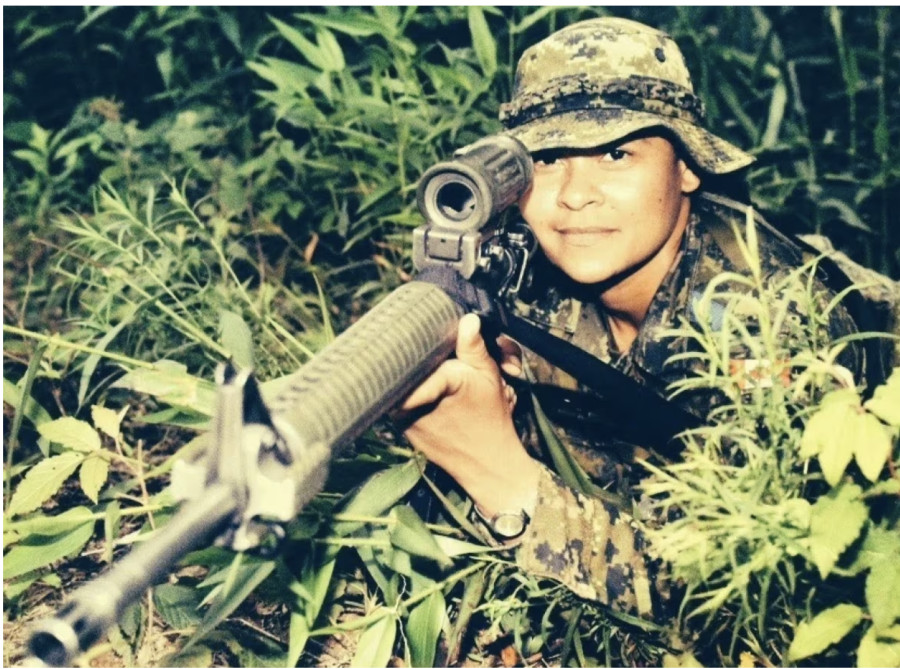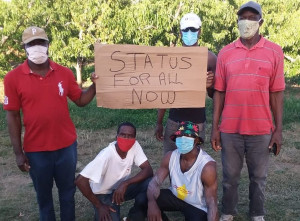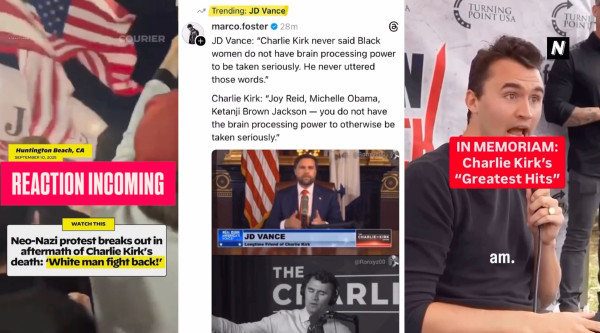When Zandra Pinette, a Black woman from Fredericton, NB, finished her Bachelor’s Degree in social work at St. Thomas University, the Canadian Armed Forces seemed the perfect place for her to make a difference.
She had gained experience in psychiatric care in Vancouver after graduating, which sparked her interest in assisting those impacted by war. Despite the traumatic nature of the role, she believed it was her calling.
“I started with my social work degree in 2003, and it was a post-degree program. I decided after working in the field in different areas of social work, particularly acute care and hospital, that I wanted to see the world. I wanted to travel, and the job as a social worker officer in the forces sounded exciting. It was a pretty rigorous application process to get in, starting with an aptitude test, physical test, vision, hearing, and medical, references, panel interview, education review, employment experiences, reference checks, and security clearance. Previously I had worked in acute care, including tertiary mental health. Tertiary is where patients would go to a specialized hospital from a normal regular psychiatric unit in a hospital because their mental health conditions could not be managed in a regular hospital setting. .”
In her role, she encountered intense cases ranging from schizophrenia and bipolar disorder to psychosis, as well as trauma related to motor vehicle accidents, burn victims, and even murder. “I found that I could operate in an environment like that. And so I knew joining the forces would be a good fit for me.”
When Zandra was drafted, she was the first social worker hired in five years for the country and one of only 25 social workers in uniform. She was excited about her prospects as a young Black woman who was screening soldiers, deciding who was fit to go to war, and her ability to do quick mental health assessments. Having been assigned to a career manager, she knew that after boot camp, she was going to leave Gagetown, NB and head to Cold Lake, AB, before getting posted in Afghanistan and the U.K. But Zandra never made it to Cold Lake.
Before heading to boot camp in Gagetown, NB, Zandra learned she was pregnant, and a few days later, she was T-boned in a car accident. Though everyone in the car survived, after noticing some spotting, Zandra was sure the accident was causing a miscarriage. Luckily, the baby was unharmed, allowing Zandra to proceed with her plans to attend boot camp.
As part of the standard procedure, all women who join the Canadian Armed Forces must undergo a pregnancy test. Though thrilled to be pregnant, her incoming baby would put an immediate stain on her reputation within the army. Upon discovering her situation, Zandra was taken to a private hospital and offered an abortion. Despite the pressure, she decided to keep the baby. This made her eligible for a year of fully paid maternity leave. One course instructor yelled at Zandra, saying, “You're pregnant, and we have to pay you for a year! What a waste of resources!”
There was considerable outrage among many individuals regarding Zandra's pay grade, as she was being compensated at the level of a Captain due to her extensive experience in social work. However, despite her qualifications, Zandra was denied the Captain stripes since she did not complete boot camp. This decision, she believed, was intended to belittle and marginalize her, possibly driven by deep-seated issues of misogyny and racism.
“They wouldn't give me my stripes. I remember soldiers coming in and looking at me and saying, ‘Well, you're a social worker, but why are you wearing an officer cadet [uniform]?’ And I said, ‘Well, I come in with experience and education, but I didn't get through boot camp because I found out I was pregnant’. And so the soldiers themselves would question me on the spot, and then they would get to know me and realize, ‘Okay, she's a seasoned social worker, this woman knows what she's doing’. But even when working, I was made to feel small.”
After maternity leave, Zandra bravely returned to complete boot camp, where she was one of five women out of a 55-person troop. Her harassment continued. One platoon commander found out what Zandra was being paid and questioned her in front of six other soldiers who worked under him. Upon researching, of course, Zandra was being paid what she was entitled to despite how it upset the white men around her. Zandra also failed a mission test that she retook and passed, and upon returning from the mission, a peer noted that based on her performance that day, her failing previously made no sense. This was further evidence that Zandra was being targeted and made to fail. But still, she persevered.
{https://www.youtube.com/watch?v=q8VjhtO9B7k}
But things would only get worse.
The social dynamics of the army raised concerns for Zandra. ‘Fraternization’ or having sexual relations with your cohort was frowned upon, but she noticed that only the women were shamed and warned of this behaviour. She recalls that course instructors would hang out with the officers they were training. But Zandra always opted to stay at a hotel away from her peers when off-base at Gagetown.
“There was drinking, going to strip clubs. It was a culture of misogyny, racism, and homophobia. I didn't hang out with the group, so I was ostracized.”
“During the weapons test, they would use parts of women's genitalia and their bodies to describe parts of a gun. One of them, they called the horse cock.”
Recently, a former female comrade of Indo-Canadian descent reached out to Zandra, reminiscing about the day a Master Corporal had forced her to say an explicit term for a weapon, causing her profound shame.
A week before her graduation, Zandra received her Captain stripes from a female Lieutenant Colonel and was swiftly dispatched to commence her French course. It was during this time that she saw even more fraternization and inappropriate behaviour, describing the treatment of women in the Canadian Armed Forces “as second class, as a body to touch and abuse, that's what I saw—to flirt with. This is how women were treated."
According to Zandra, a fellow woman took it upon herself to gather the small group of female soldiers and deliver a stern message. “You're in the forces now; you must be very careful with your behaviour and how you conduct yourselves because of your reputation. If you get involved with fraternization. it will follow you."
“It was a warning,” Zandra adds. “And I remember that to this day."
Zandra observed people covering up fraternization and an increasing number of sexual assaults, misconducts and rape. Though she was encouraged to be part of this group she stayed away out of fear for her reputation, heightened as a Black woman and impacted by having studied gender studies.
On February 7th, 2014, despite staying away from fraternization and ostracizing herself to stay safe, Zandra says she was raped.
She attended a mess dinner on the 6th, stayed past midnight, had more drinks than normal and woke up beside her boss, the Lieutenant Colonel, with no recollection of what occurred and a headache unlike any she’d ever experienced. Her clothes were scattered, her pantyhose torn and her blouse was missing buttons.
Later, she would hear gossip about people being assaulted and being roofied, and it clicked. Zandra believes she was drugged and raped that evening. Not only was this evening out of character for Zandra, but as usual, she had gotten a hotel to stay away from everyone else, but this time with her 14-year-old son. This assault had caused her to unintentionally abandon him, something she would never do.
“It was close to about 11 a.m., my head felt like it was split open, and I was nude. I opened my eyes and knew I wasn't in my hotel room. My son's bed would have been positioned exactly where I was looking. I remember turning and seeing my boss sleeping beside me. And the horror I felt and the shaming that came after that, the lack of support, the lack of care and concern from the health providers, my own colleagues, who knew what had happened.”
She recounts how the man who conducted her administrative review after the alleged assault was a direct colleague of the Lieutenant Colonel who assaulted her.
“This administrative review, having been questioned by a man, a white man, a Lieutenant Colonel, that was the same rank as my perpetrator, who worked in the same building, two colleagues, asking me about what happened that night. I remember his words, he said, ‘We need to be very careful during this process because of your reputation and his.’ I remember those words, and I thought of the shaming, the guilt that was put on me. The military police said, ‘he said it was consensual’. And I remember saying, ‘How can you consent when you're intoxicated? Isn't that the law? You can't say yes. You can't.’
And they did nothing about it. Zandra was also told by a Legal Officer for the Canadian Armed Forces that they [the legal team] had been called to the colonel’s office to do damage control after Zandra went to a Sexual Assault Nurse Examiner. I put in a voluntary release, and I was out of the forces within three months."
Zandra was put on medical leave up until the time she heard that the perpetrator had been moved to Ontario and stripped of his command and 600 soldiers under him. He was never charged, and he is still working elsewhere in a position of power and command.
Eventually, Zandra was diagnosed with PTSD. She says she would just sit in the living room with a knife beside her and needed reminders from her mother to do simple tasks like eat and shower.
Zandra first applied for the Critical Injuries Benefit in 2016 and was denied. But the victory of another veteran changed things. Fabian Henry had witnessed two soldiers die in combat and was diagnosed with PTSD. His claim for the Critical Injuries Benefit was at first denied. But in 2022 Henry was granted the Critical Injuries Benefit for PTSD, setting a precedent as the first in Canada to receive the benefit for a psychological injury.
After this, Zandra reapplied and won. She received the benefit and appears to be the first woman, and Black woman, to ever receive it for PTSD due to sexual assault—though other cases are out there.
“I'm very fortunate to be a veteran. I am very fortunate to be a single mother who can support her children on her own completely. I live in a nice home. I have the things that I need. My children have the things that they need. Thanks to Veteran Affairs, who deposit money in my bank account once a month, right? For what I suffered and no amount of money can make a wrong right, and I know that with the culture of the military and the conversations still happening they’re trying to keep me happy. They're trying to keep me alive to tell a story that is a very important one. ”Zandra also recognizes many have been assaulted who may have been in uniform but not on duty or were on base but not on duty and won’t get the same PTSD diagnosis or compensation Zandra has received.
As a social worker, being an advocate comes naturally to Zandra. She says she has laughed, cried, and had repressed memories return but is proud to say she’s made it through. She was chronically suicidal and had thoughts daily until 2022 but says that darkness has subsided. She’s also connected with a community that reminds her she’s not alone.
“Women have reached out to me to say, ‘Zandra, me too. That happened to me, too.’ Women are debriefing with each other right now. Some groups have been formed around the country for military sexual trauma. People are having the conversation. It's all over the news. The conversation started in 2014, and here we are a decade later, and it's still a major problem. I read a recent article that between 2021 and 2023, the cases have almost doubled, and almost half are made up of men who are being abused.” Zandra adds, “Survivors are talking to survivors, and survivors are supporting survivors.”
Zandra wants to continue to create change and plans to open a small Afro-centric social work office in Nova Scotia in 2025.

 By
By 








